

Neurological Disorders A-Z. Case studies continue to illuminate the cognitive neuroscience of memory. The current ubiquity of functional neuroimaging studies, and the importance they have had in elucidating brain function, obscures the fact that much of what we know about brain-behavior relationships derives largely from the study of single- and multiple-patient cases.
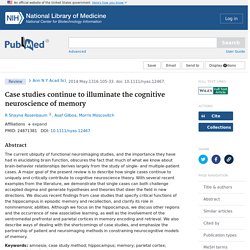
A major goal of the present review is to describe how single cases continue to uniquely and critically contribute to cognitive neuroscience theory. With several recent examples from the literature, we demonstrate that single cases can both challenge accepted dogma and generate hypotheses and theories that steer the field in new directions. We discuss recent findings from case studies that specify critical functions of the hippocampus in episodic memory and recollection, and clarify its role in nonmnemonic abilities. Keywords: amnesia; case study method; hippocampus; memory; parietal cortex; ventromedial prefrontal cortex. DSM-5 Diagnostic Criteria for Schizophrenia – MedicalCRITERIA.com. Schizophrenia is a psychiatric syndrome characterized by psychotic symptoms of hallucinations, delusions, and disorganized speech, by negative symptoms such as decreased motivation and diminished expressiveness, and by cognitive deficits involving impaired executive functions, memory, and speed of mental processing.The specific DSM-5 criteria for schizophrenia are as follows: References: Marder SR, Cannon TD.

Schizophrenia. Understanding Mental Disorders - a consumer guide for anyone who has been touched by mental illness.
When Will We Solve Mental Illness? The second guidepost concerns the impact of biology.

Although there are several important exceptions, measurable differences in brain biology appear to contribute only a fraction of added risk for developing persistent mental problems. Genetic inheritance surely plays a role, but it falls well short of a stand-alone “cause” in most people who receive a diagnosis. The remainder of the risk is supplied by experience: the messy combination of trauma, substance use, loss and identity crises that make up an individual’s intimate, personal history. Biology has nothing to say about those factors, but people do. All Disorders.
ADHD. AIDS. ALS. Alzheimer's. Anxiety. Aphasia Types. Apraxia: Review and Update. Autism. Cerebral Palsy. Chronic Fatigue Biomarkers. People suffering from a debilitating and often discounted disease known as chronic fatigue syndrome may soon have something they’ve been seeking for decades: scientific proof of their ailment.
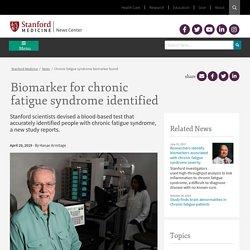
Researchers at the Stanford University School of Medicine have created a blood test that can flag the disease, which currently lacks a standard, reliable diagnostic test. “Too often, this disease is categorized as imaginary,” said Ron Davis, PhD, professor of biochemistry and of genetics. When individuals with chronic fatigue syndrome seek help from a doctor, they may undergo a series of tests that check liver, kidney and heart function, as well as blood and immune cell counts, Davis said.
“All these different tests would normally guide the doctor toward one illness or another, but for chronic fatigue syndrome patients, the results all come back normal,” he said. The problem, he said, is that they’re not looking deep enough.
COVID-19-Brain. CTE. Depression. Delirium. The emergence of a syndrome-specific personality profile in young children with Down syndrome. Dyslexia. Epilepsy. Prosopagnosia - Face Blindness. Fetal Alcohol Syndrome. Confusion of Amnesia, Analgesia, and Sedation Really a Safety Issue - Anesthesia Patient Safety Foundation. General Question Has OBA Impact To the Editor I address the controversy surrounding the use of conscious IV sedation.
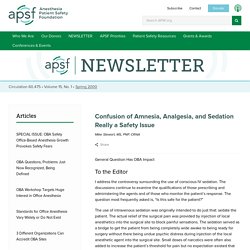
The discussions continue to examine the qualifications of those prescribing and administering the agents and of those who monitor the patient’s response. The question most frequently asked is, “Is this safe for the patient?” The use of intravenous sedation was originally intended to do just that: sedate the patient. Gerstmann Syndrome - StatPearls - NCBI Bookshelf.
Huntington's Disease. The Surprising Solution to the Imposter Syndrome. Korsakoff's Syndrome: A Critical Review - PubMed. In this review, we present a survey on Korsakoff's syndrome (KS), a residual syndrome in patients who suffered from a Wernicke encephalopathy (WE) that is predominantly characterized by global amnesia, and in more severe cases also by cognitive and behavioral dysfunction.
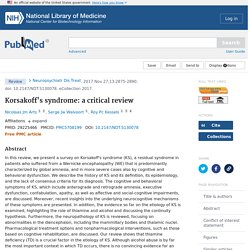
We describe the history of KS and its definition, its epidemiology, and the lack of consensus criteria for its diagnosis. The cognitive and behavioral symptoms of KS, which include anterograde and retrograde amnesia, executive dysfunction, confabulation, apathy, as well as affective and social-cognitive impairments, are discussed.
Moreover, recent insights into the underlying neurocognitive mechanisms of these symptoms are presented.
Migraine. Multiple Sclerosis. Semiology of neglect: An update. Abstract Hemispatial neglect is a common disabling condition following brain damage to the right hemisphere.
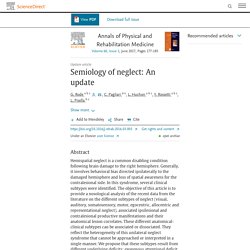
Generally, it involves behavioral bias directed ipsilaterally to the damaged hemisphere and loss of spatial awareness for the contralesional side. In this syndrome, several clinical subtypes were identified. The objective of this article is to provide a nosological analysis of the recent data from the literature on the different subtypes of neglect (visual, auditory, somatosensory, motor, egocentric, allocentric and representational neglect), associated ipsilesional and contralesional productive manifestations and their anatomical lesion correlates.
Phantom limb. Prion Disease. Psychopathy. PTSD. Schizophrenia. Self-Awareness (disorders of) Simultagnosia. Split Brain. Spina Bifida. Stroke. Tourette Syndrome. Psychosurgeons Use Lasers to Burn Away Mental Illness. Donepezil in the Prevention and Treatment of Post-Surgical Delirium. Next-Generation Treatments for Mental Disorders. Voices `told woman' she had brain tumour. Low Activity Microstates During Sleep. Ventral Striatum - an overview.
Why do viruses often come from bats? A discussion with your friendly neighborhood virologist : science. Bidirectional prefrontal-hippocampal dynamics organize information transfer during sleep in humans. Prefrontal cortex sleep - PMC - NCBI. Long spaceflights affect astronaut brain volume. Extended periods in space have long been known to cause vision problems in astronauts.
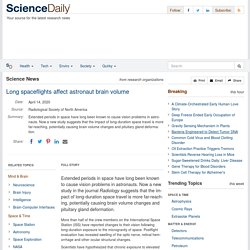
Now a new study in the journal Radiology suggests that the impact of long-duration space travel is more far-reaching, potentially causing brain volume changes and pituitary gland deformation. Spider venom key to pain relief without side-effects. Molecules in tarantula venom could be used as an alternative to opioid pain killers for people seeking chronic pain relief.
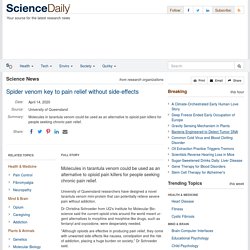
University of Queensland researchers have designed a novel tarantula venom mini-protein that can potentially relieve severe pain without addiction. International Journal of Neural Systems. Reel-Example: Conduction Aphasia 1. Obesity is Inflammatory Disease, Rat Study Shows. Scientists led by Dr David Fairlie from the University of Queensland, Australia, have found abnormal amounts of an inflammatory protein called PAR2 in the fat tissues of overweight and obese rats and humans.

PAR2 is also increased on the surfaces of human immune cells by common fatty acids in the diet. When obese rats on a diet high in sugar and fat were given a new oral drug that binds to PAR2, the inflammation-causing properties of this protein were blocked, as were other effects of the high-fat and high-sugar diet, including obesity itself. Zucker Rat, a pet rat that has developed diabetes as a result of a genetic disorder that causes obesity. Image credit: Joanna Servaes / CC BY-SA 3.0. “This important new finding links obesity and high fat, high sugar diets with changes in immune cells and inflammatory status, highlighting an emerging realization that obesity is an inflammatory disease,” Dr Fairlie said.
Lim J et al. 2013. Research Findings on Memory and Cognitive Impairment in ECT. Dr. Peter Como presented to the U.S. Role of the bed nucleus of the stria termina... [Eur J Pharmacol. 2003. Ethics Education and Psychology: British Psychological Society Critiques DSM-5. The British Psychological Society responds to the new DSM-5. A prior blog post looked at some criticism of the DSM-5. The British Psychological Association offers a more formal, 26-page critique. The entire document can be found here. The first part of the critique is posted for your review. Alien limb syndrome: A Bayesian account of unwanted actions. Alien limb syndrome has attracted a wide public interest due its unusual clinical manifestations (e.g., Mosley, 2011). The term ‘alien limb’ itself implies an enigmatic and dramatic nature of an otherwise debilitating disorder.
A Case of Right Alien Hand Syndrome Coexisting with Right-Sided Tactile Extinction. Introduction. The alien hand syndrome. Brain Fog After Heart Failure Improves with Walking and Brain Games. The older you get, the more likely you are to worry about keeping your memory intact. If you are among the 5.7 million adults in the United States living with heart failure, a potentially fatal condition, you might have another reason for concern—brain fog, a subtle form of memory loss.1 Certainly, losing your mental alertness is something you’d want to avoid or postpone long into the future.